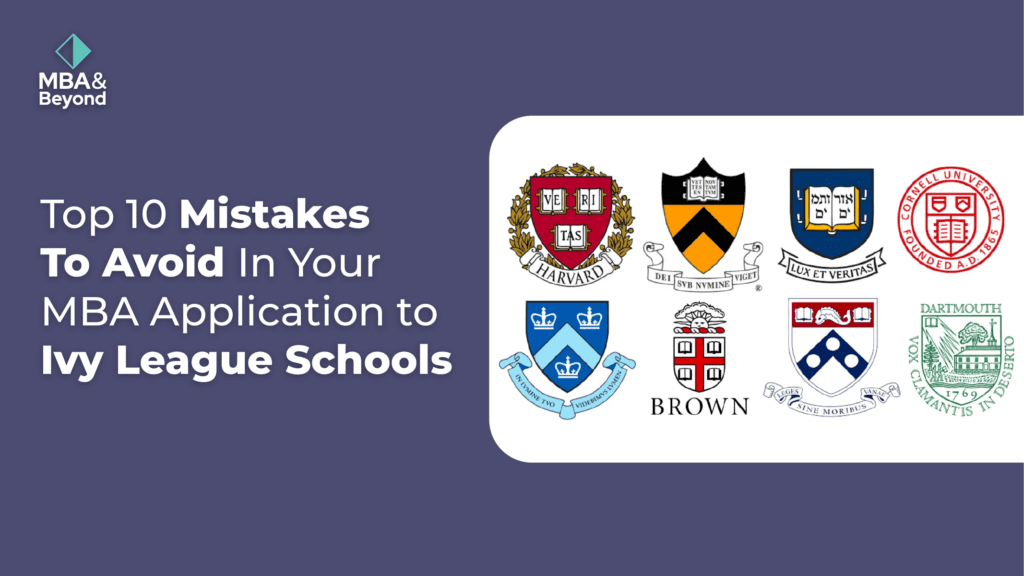Top 10 Mistakes to Avoid in Your MBA Application to Ivy League Schools

Ivy League MBA programs are among the top business schools in the world, and their admissions process is highly competitive. A strong application can make all the difference, but even small mistakes can hurt your chances. To help you avoid these chances, we have outlined the top 10 MBA application mistakes students often make when applying to Ivy League MBA programs.
1. Weak Personal Statement
Your personal statement is your chance to tell your story and stand out from other applicants. Many candidates make the mistake of focusing too much on their achievements and not enough on their personal journey. Ivy League schools want to know what makes you unique—your values, experiences, and what drives you. Make sure your personal statement reflects who you are, not just what you have done.
2. Inconsistent Career Goals
An inconsistent career goal is a common MBA application mistake. Admissions committees want to see that you have a proper blueprint for your future and that an MBA from their school is essential to reaching that goal. Be specific about your career path and state how the program aligns with your objectives.
3. Poorly Researched School Selection
One common mistake is not curating a unique your application to each Ivy League school. Each program has its unique strengths, culture, and values, and admissions committees can easily tell if you have submitted the same application.
For example, if you are applying to Wharton, you should emphasize your interest in finance, since it’s known for its finance programs. On the other hand, Harvard values leadership and global impact, so your application should highlight your leadership experiences.
Want to pursue an MBA but not sure if your profile fits?
Talk to our Profile Experts to know your chances for a top MBA Program.
GET A FREE PROFILE ANALYSIS4. Not Addressing Weaknesses
Another common MBA application mistake is ignoring weaknesses in your application. Address issues like low GMAT score, gap in employment, etc. directly rather than hoping the admissions committee will question them. Support your evidence of weakness with a counter plus point skill.
For example, if you have low test scores, you can explain how your work experience demonstrates the skills the test measures, or how you have taken additional courses to improve your quantitative abilities.
5. Overemphasizing Test Scores
While a good GMAT or GRE score is important, focusing only on test scores is a mistake. Ivy League schools look for well-rounded candidates who excel in various areas. Highlight your achievements in other fields as well.
6. Weak Letters of Recommendation
Choosing the wrong recommender is a common MBA application mistake. A high-profile recommender, like a CEO or professor, who writes a generic letter cannot help your case. Instead, choose people who can provide detailed, personalized insights into your character and accomplishments.
7. Ignoring Extracurriculars and Leadership
Ivy League schools value leadership and extra-curriculars outside of work or academics. Many students focus solely on professional achievements, but admissions committees are looking for well-rounded candidates who have made an impact in their communities or pursued passions beyond the office. For example, if you have organized charity events, led a volunteer group, or been part of a sports team, these experiences can highlight your leadership skills and initiative.
8. Underestimating Interviews
Many students think that their written application is enough, but the interview is a critical part of the process. Being too scripted can make you come across as inauthentic, while being underprepared can lead to inconsistent answers. Practice is key. Admissions committees want to see that you can back up your application with real, thoughtful insights. Make sure to prepare answers to common questions, such as why you want an MBA and how you have demonstrated leadership, while remaining flexible to adapt the conversation. For better performance, practice mock interviews.
9. Poor Time Management
Rushing through your essays, recommendations, and even proofreading can lead to certain MBA Application mistakes that could have been easily avoided. For example, submitting just before the deadline increases the risk of typos, poorly written essays, or missing crucial elements. Starting early allows you to review your application multiple times, seek feedback, and ensure that every piece is polished. Time management is crucial for creating a thoughtful, well-organized application.
10. Not Seeking Feedback
Failing to get outside feedback is another common MBA Application mistake. While you may feel confident in your application, a feedback can help you highlight the things you have missed, such as unclear goals or weak essays. Feedback from mentors, peers, or admissions consultants can help you refine your application and ensure it’s as strong as possible.
Conclusion
Avoiding these common MBA application mistakes can significantly improve your chances of securing a spot in an Ivy League MBA program. With careful planning, tailored applications, and a focus on showcasing your authentic self, you can stand out in the competitive admissions process.
An Ivy League business school has a very competitive acceptance rate, and to get into it, you need to know what the b-school is looking for, and in doing so, you need to network with alums, current students, experts who have a strong understanding of Ivy League. Our experts have helped many applicants get into their dream B-schools with their exclusive MBA application tips.
If you’d like, we are happy to hop on a 1:1 call with you and help you strategize your MBA applications to your target schools.



Leave a Reply